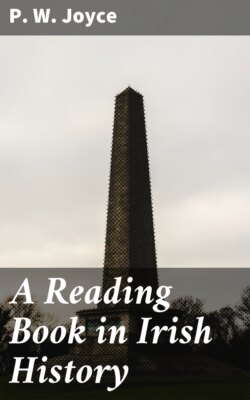Читать книгу A Reading Book in Irish History - P. W. Joyce - Страница 5
На сайте Литреса книга снята с продажи.
III.
THE RELIGION OF THE PAGAN IRISH.
ОглавлениеTable of Contents
So far as we are able to judge from our old writings, the pagan Irish had no one religion common to all the people, and no settled general form of worship. They had many gods; and it would appear that every person chose whatever god he pleased for himself. Some worshipped idols; and we read of certain persons who had spring wells for gods: while some again adored fire, and others the sun and moon. The people also worshipped the shee or fairies, who were supposed to live in grand palaces underground, as described at page 3. The persons who taught the people all about these gods were the Druids, who were the learned men of those times. They were believed to be wizards, and some think that they were pagan priests.
The pagan Irish had a dim notion of a sort of heaven, a happy land of perpetual youth and peace. It was believed that there were many happy lands in different places, which were called by various names, such as Moy-Mell, I-Brazil, and Tirnanoge. Some were out in the Atlantic Ocean, off the western coast, while others were down deep beneath lakes, and some in caves under forts or cairns. They were all inhabited by fairies, who sometimes carried off mortals: and those whom they brought away hardly ever came back. A fairy who wished to allure a mortal often chanted a sort of magical song called an incantation, which exercised a spell over the person that listened to it.
There is a pretty story, more than a thousand years old, in the Book of the Dun Cow, which relates how Prince Connla of the Golden Hair, son of the great king Conn the Hundred-fighter, was carried off by a fairy from the western shore in a crystal boat to Moy-Mell. One day—as the story relates—while the king and Connla and many nobles were standing on the sea-shore, a boat of shining crystal approached from the west: and when it had touched the land, a fairy, like a human being, and richly dressed, came forth from it, and, addressing Connla, tried to entice him into it. No one saw this strange being save Connla alone, though all heard the conversation: and the king and the nobles marvelled, and were greatly troubled. At last the fairy chanted the following words in a very sweet voice: and the moment the chant was ended, the poor young prince stepped into the crystal boat, which in a moment glided swiftly away to the west: and prince Connla was never again seen in his native land.
THE CHANT OF THE FAIRY TO CONNLA OF THE GOLDEN HAIR.
I.
A land of youth, a land of rest,
A land from sorrow free;
It lies far off in the golden west,
On the verge of the azure sea. A swift canoe of crystal bright, That never met mortal view— We shall reach the land ere fall of night, In that strong and swift canoe: We shall reach the strand Of that sunny land From druids and demons free; The land of rest, In the golden west, On the verge of the azure sea!
II.
A pleasant land of winding vales, bright streams, and verdurous plains, Where summer, all the live-long year, in changeless splendour reigns; A peaceful land of calm delight, of everlasting bloom; Old age and death we never know, no sickness, care, or gloom;
The land of youth,
Of love and truth,
From pain and sorrow free;
The land of rest,
In the golden west,
On the verge of the azure sea!
III.
There are strange delights for mortal men in that island of the west;
The sun comes down each evening in its lovely vales to rest:
And though far and dim
On the ocean's rim
It seems to mortal view,
We shall reach its halls
Ere the evening falls,
In my strong and swift canoe;
And ever more
That verdant shore
Our happy home shall he;
The land of rest,
In the golden west,
On the verge of the azure sea!
IV.
It will guard thee, gentle Connla of the flowing golden hair,
It will guard thee from the druids, from the demons of the air;[5] My crystal boat will guard thee, till we reach that western shore, Where thou and I in joy and love shall live for evermore:
From the druid's incantation,
From his black and deadly snare,
From the withering imprecation Of the demon of the air,
It will guard thee, gentle Connla of the flowing golden hair;
My crystal boat will guard thee, till we reach that silver strand,
Where thou shalt reign in endless joy, the king of the Fairy-land!
From "Old Celtic Romances," by P. W. Joyce, LL.D.
| Stone hatchet in the National Museum, Dublin: probably used as a battle-axe. Before metals came into general use, tools and weapons of various kinds, in Ireland as well as in other countries, were made of stone, flint being commonly used for making cutting-instruments, such as knives. But this was at a very early period, mostly before the time when our written history begins. | Bronze head of Irish battle-mace: now in the National Museum Dublin. It was fitted with a handle which was fastened in the socket; and it was used for striking in battle. It is double the size of the picture. Weapons of this kind were in use at a very early time, long before the beginning of our regular history. |
